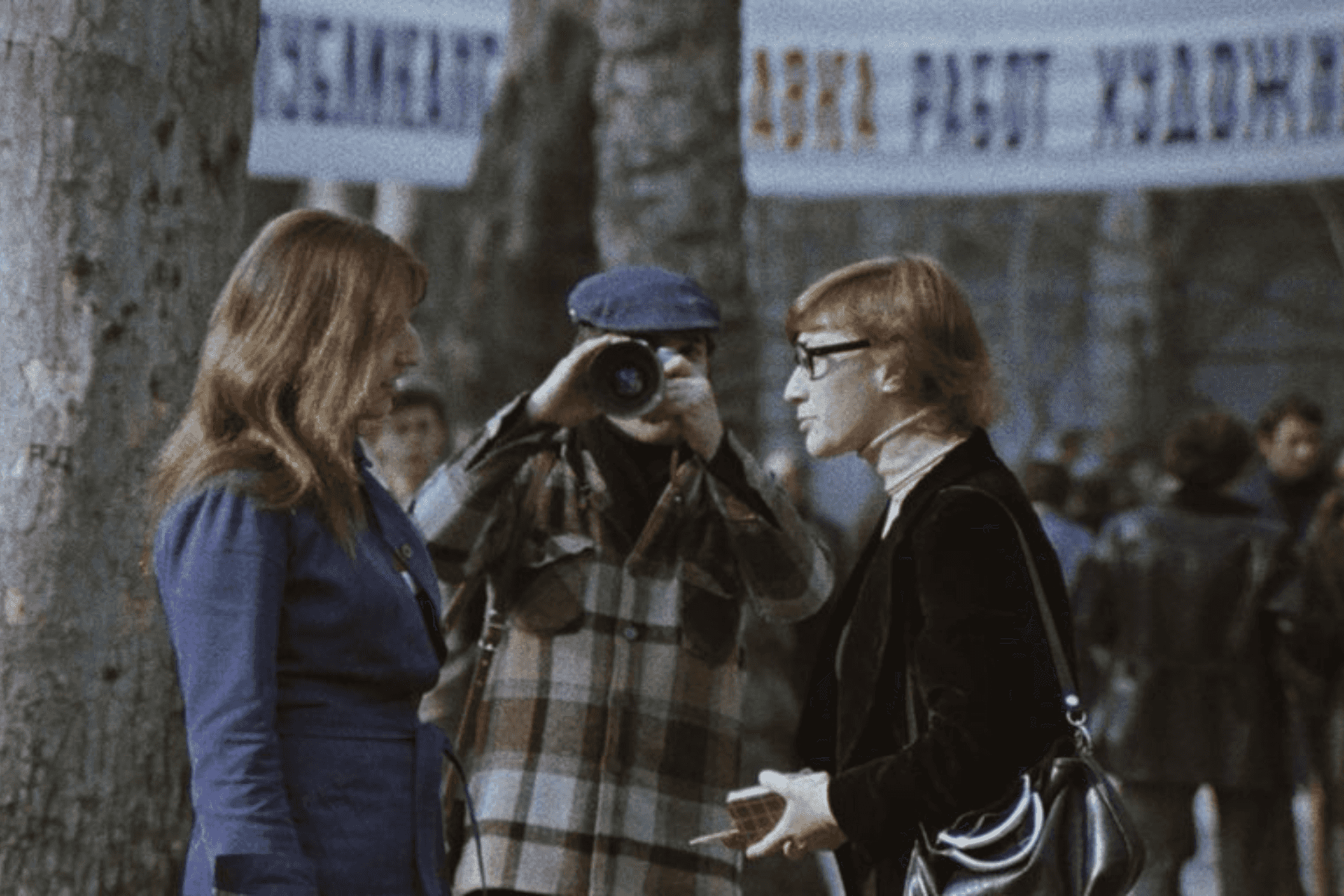
★★★☆☆
An ephemeral time capsule of the early foreign agent law protests showing intimate portraits of the young Georgians caught in their midst.
The film programme of Berlin’s Gantiadi cultural festival concluded with a screening of Inner Blooming Springs (Shinagani gazapkhulebis q’vaviloba, 2025), a mid-length documentary by Tiku Kobiashvili.
Covering the first wave of protests against the reintroduced foreign agent law in the spring of 2024, the film had its world premiere in Berlinale this February, where it was picked up by the Forum Special section themed ‘Open Wounds, Open Words’, which centered politically engaged films by young filmmakers. Inner Blooming Springs, however, is first and foremost a diary of friendship and coming of age.
The documentary follows Kobiashvili’s two long-time friends, Tina and Luka, whose everyday life revolves around friends, family, and acting studies. That is, until Georgia’s foreign agent law gets presented in the parliament, and their life gets swept away by the ill-fated protests.
The protests are only half of the story, however: Kobiashvili builds intimate portraits of a younger generation of Georgians, showing their lives are nothing like the farfetched antagonistic rhetoric about Gen-Z shared by conservative scaremongerers.
Tina’s conversations with her family and Kobiashvili centre the dilemma of what an actress is supposed to look like — for example, feeling she doesn’t fit into the rigid expectations of the profession and perhaps doesn’t want to fit them, anyway. These intimate interactions about the preoccupations of these students is the film’s strength. A generation coming of age during the struggle to shift cultural norms in Georgia, they find themselves navigating not only political, but also personal uncertainties of what the future will look like.
The moments of amusing, loving interactions with family members, or the hang-outs of the trio’s larger friend group, fill the documentary with gentle charisma. Dinners, cigarette breaks, trips outside the city — they positively reflect the friendships between Georgians that exist in a form I have not witnessed in my own Lithuanian culture, and definitely not in German culture either. I was left wishing Kobiashvili focused on these moments as the main motif of the film, as they reveal a very special, personal universe all its own.
The political substance of Inner Blooming Springs barges in on the friend group unexpectedly. As with the first March protest in 2023 — when the ruling Georgian Dream party first presented the draft law and, after a short wave of violent protests, retracted it for revision — there is, a year later, an optimistic expectation in the air that this time, too, it will be a short and successful fight. The camera observes friends gearing up for the protests and taking to the streets. It catches, in real time, friends reacting to the footage of worsening police brutality shared on social media. Ill-feeling spreads, as do debates about ways to ensure safety. One of the friends gets tear gassed. Kobiashvili is in the midst of the crowd, capturing the early chaos of the protests.
Moments of special interest include the political commentary from these students. They know what they stand against, but many feel they don’t have anyone to follow, to stand with them. Frustrated with a lack of viable opposition options that suit them, their participation in protests is value-based, which foreshadows the impending struggle to organise a clearly directed counter-movement against the ruling party.
During a screening of the documentary at Berlinale that I attended, Kobiashvili started the discussion by making it clear that by then, what the audiences saw in the film was child’s play compared to the crackdown on the still ongoing protests that erupted after Georgia’s EU U-turn last year. As such, Inner Blooming Springs is an ephemeral time capsule of the early protests, only retrospectively foreboding the imminent brutal repression of the protest movement.
Its inclusion in Gantiadi’s programme sums up its purpose, which is to educate foreign audiences on the current political crackdown in Georgia. As such, it somewhat succeeds, though is hindered by showing only the genesis of the political and social upheaval, instead of showing its real proportions by having spent a longer time in the production phase. Without the crew present to add necessary context to unfamiliar audiences, screenings of the film are bound to suffer from insufficient information within the documentary itself.
While the urgency to present Inner Blooming Springs internationally is understandable, it also results in the film feeling transient, unfinished. Then again, thematically, it suits the young friends’ experiences in the film: their search for themselves, their path into adulthood is suddenly arrested by the government putting everyone’s personal lives on hold with its crackdown on civil society and the sabotage of Georgia’s democratic future.
The documentary’s strengths lie in its dissidence and grassroots filming approach comparable to the political third cinema filmmaking. For domestic viewers, the film itself bears no surprises. However, as Kobiashvili said in an interview, with Inner Blooming Springs, she hopes to remind Georgians that ‘cinema and art are powerful, independent, and deeply political spaces. They are living, breathing forces that no amount of censorship can silence’.
One might add that the same goes for Georgians.
Film details: Inner Blooming Springs (2025), directed by Tiku Kobiashvili. It will premiere in the UK on 4 October as part of the 2025 London Georgian Film Festival.










